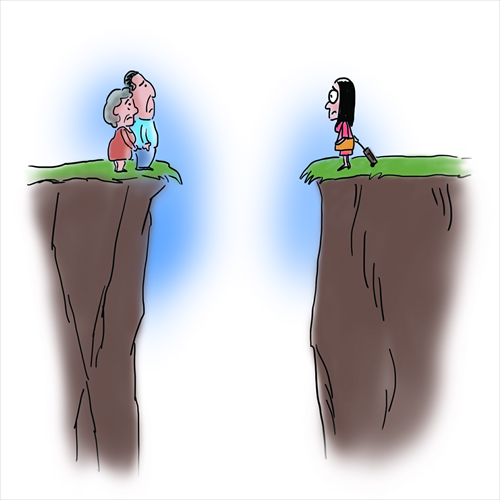Are Chinese children responsible for their parents’ happiness?

Illustration: Shen Lan/GT
It is a shame to admit it, but I cannot stand staying with my parents for more than three days, no matter how much I love and appreciate them. Quite a lot of the grown-up one-child generation face this vast generation gap, because of the huge social changes occurring in China over the past several decades.
I was glad I had a perfect excuse to pass the toughest family "interrogation" time during the Chinese New Year holiday, as I moved to Sydney to pursue my master's degree. However, my parents never gave up making me feel guilty, because they are my parents.
Last year, in the morning of the Spring Festival day, I got an email attached with a link from my father, "Why women should get married before 30." I replied with a link to a book, Do Not Marry Before Age 30 by Joy Chen, who was once the deputy mayor of Los Angeles. He replied, "You are too Westernized."
When I made the decision to go to Sydney, my cousin, who was merely three years older than me, spoke to me with contempt, "Why do you go overseas to study at your age? Your parents worked so hard to bring you up. As a woman, you should just find a job and husband here and take care of them. You failed in your duty to your parents."
Growing up in China, I was taught that "filial piety" was one of the fundamental virtues in Chinese traditional culture. I feel responsible for my parents' happiness in their old age. It quickly makes me feel guilty about leaving my parents for my dream and not giving birth to their grandchildren.
I frequently ask myself why I feel guilty about my decisions on when to get married and have children?
To release my guilt, I have seriously considered "renting" a boyfriend or take my gay friend's suggestion to be a surrogate mother. I am not mad. I am desperately seeking for a solution to balance my parents' happiness and my happiness.
Apparently, the pressure and criticism toward people like me are not only from parents and relatives but also from society. In China's traditional society, the quality of life for old people depends on their offspring, as an old Chinese saying goes "raising a son to take care of the elderly." If that is an important reason for people to have children, isn't it a bit selfish?
I have complex feelings when watching media or public organs calling for adults to wash their parents' feet to show their filial piety. Is this really the best criteria for filial children?
In Australia, I seldom hear about parents giving their life savings to children for university tuition or to purchase a house. I see most of my Australian classmates work hard in shops, cafés and bars to pay their fees. Accordingly, Western parents do not push their kids to chase the dreams they built up for them.
Along with many other Chinese, I benefited from my parents' financial support as a student because of the lack of full scholarships in China. Moreover, thanks to the one-child policy, I was be able to finish my university with all family resources, since I was the only girl in my family.
When I traveled to the Sunshine Coast in Australia, I met a couple in their 60s on holiday. I asked them whether they help to take care of their grandchildren. The wife laughed, "We have done our duties to our children. It is time for us to enjoy our life. Get me out of there." They think young, and live young.
As soon as Chinese parents reach 50, many start to complain about their age and expect more attention and respect from their children. I do not expect that my parents can lead such carefree lives as the Australian couple, but isn't it a good idea to find a new lifestyle or a new hobby to enrich retirement?
I have been making efforts to get closer to my parents. I make big resolutions every holiday to be the "obedient" daughter when I visit them. However, we usually end the holiday with arguments on some trivia.
A few years ago, when my father was in hospital, I was willing to pay a professional caregiver to take care of him and let my mother rest. Both my parents criticized this as immature, and did not want to waste money on unnecessary things.
I understand this is the way they brought me up, but sometimes the habit is not very efficient, scientific or even healthy. And, it is OK for them to maintain an old-fashioned life style, but it is not comfortable if they want to make me live in the same way. Yet once I disagree, I am not a "good daughter."
I appreciate the good in Chinese tradition and I understand it is not easy for our parents to adjust to modern life. Can we compromise with each other, and make efforts for both of our satisfaction?
We have duty to take care of our parents, but happiness probably has to stem from within.
Mutual respect is based on understanding and communication, not old-fashioned patriarchal behavior.
The author worked for the Guardian Beijing office as a researcher and news assistant and is a master student in the University of Technology, Sydney. huang.cecily@gmail.com